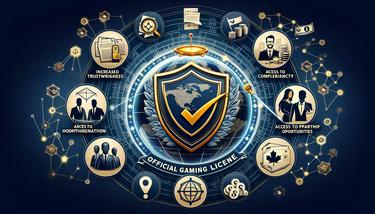What are the advantages of obtaining an official gaming license for gambling business operators?
Obtaining an official gaming license[1] offers numerous advantages for gambling business operators. It not only legalizes their operations but also enhances their credibility and market access[2]. This document outlines the key benefits of securing an official gaming license.
Key Advantages
- Legal Operation: A license allows operators to conduct their business within the legal frameworks of the jurisdictions they operate in.
- Enhanced Credibility: Licensed operators are seen as more trustworthy by players, partners, and financial institutions.
- Access to Markets: A gaming license opens up access to markets where gambling is regulated and legal.
- Banking and Payment Services: Licensed operators can access a wider range of payment and banking services, facilitating smoother business operations.
- Partnership Opportunities: Licensing increases the potential for partnerships with software providers, affiliates, and other stakeholders.-
- Protection from Legal Action: Operating with a license minimizes the risk of legal penalties and sanctions[3].
- Responsible Gambling[4]: Licensing authorities often require adherence to responsible gambling practices, promoting a safer gambling environment.
Introduction
Obtaining an official gaming license is a critical step for any gambling business operator looking to establish a legitimate and successful operation. Beyond legal compliance[5], a gaming license offers numerous advantages that can significantly impact the business’s growth and sustainability.This document outlines the key benefits of securing an official gaming license for gambling operators.
Legal Operation and Compliance
The most immediate advantage of obtaining a gaming license is the ability to operate legally within a given jurisdiction. This compliance opens doors to various markets and ensures the business is protected against legal challenges and shutdowns.Legal operation also facilitates compliance with international standards and regulations, crucial for businesses operating in multiple countries.
Enhanced Credibility and Trust
A gaming license serves as a mark of credibility and reliability, reassuring players and partners of the operator’s commitment to fair play[6] and security. This enhanced trust can attract more customers, retain existing ones, and open opportunities for partnerships with reputable companies in the industry.Credibility is essential for building a strong brand and reputation in the competitive gambling market.
Access to More Markets
With a gaming license, operators can access a wider range of markets, including those with strict regulatory requirements. This expansion capability is vital for growth and diversification, allowing businesses to tap into new customer bases and revenue streams.Expanding into new markets also exposes the operator to diverse gaming cultures and preferences, enriching the business’s offerings.
Working with Reputable Payment Processors and Software Providers
A valid gaming license is often a prerequisite for partnering with leading payment processors and software providers. These partnerships are crucial for offering a seamless and secure user experience, featuring a wide range of payment options and high-quality games.Collaborating with top industry providers enhances the platform’s functionality and appeal, driving user engagement and satisfaction.
Conclusion
The advantages of obtaining an official gaming license extend far beyond legal compliance, impacting nearly every aspect of a gambling business’s operation. From enhancing credibility to enabling market expansion and fostering reputable partnerships, a gaming license is an indispensable asset for gambling operators.Investing in the licensing process is a strategic move that lays the foundation for a secure, reputable, and flourishing gambling enterprise.
- Gaming license — A permit issued by regulatory authorities allowing an entity to legally operate a gambling business, including online casinos, sports betting, and other gaming activities.
- Market Access — The ability of gambling operators to offer services in different jurisdictions, contingent upon obtaining the necessary licenses and complying with local regulations.
- Sanctions — Penalties imposed on gambling operators for non-compliance with regulatory standards or laws.
- Responsible Gambling — Initiatives and practices aimed at promoting safe and controlled gambling, preventing gambling addiction, and protecting vulnerable players.
- Compliance — The act of adhering to legal standards and regulations established by governmental bodies and regulatory agencies, particularly in the context of financial operations and transactions involving cryptocurrencies.
- Fair Play — The principle that gambling games are operated in a manner that is fair, transparent, and free from manipulation.
- Gambling Commission. (n.d.). Benefits of holding a license.
- Malta Gaming Authority (MGA). (n.d.). Licensing.

